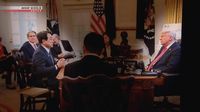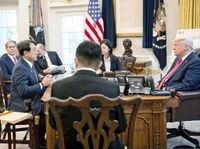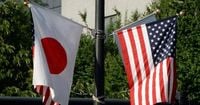In a critical meeting at the White House on April 16, 2025, U.S. President Donald Trump and Japan's Economic Revitalization Minister Ryosei Akazawa discussed tariffs and trade relations between their countries. This meeting comes at a time of heightened concern for Japan regarding the potential intertwining of security issues with economic negotiations.
During the talks, Trump raised concerns about Japan's financial contribution to the stationing of U.S. troops on Japanese soil, stating that Japan's share was too small. However, he did not delve deeply into security issues, which the Japanese government was wary of turning into bargaining chips in tariff negotiations. Early that morning, Trump had posted on social media that the "cost of military support" would be on the table during the negotiations, causing anxiety among Japanese officials.
Prime Minister Shigeru Ishiba responded to the situation by convening an emergency meeting with Chief Cabinet Secretary Yoshimasa Hayashi shortly after 10 p.m. on the same day. They agreed that if new demands regarding security were raised, Akazawa would carefully explain Japan's efforts in this area but would ultimately take the matter home, indicating he lacked the authority to negotiate security terms.
Japan is currently paying a total of ¥1.055 trillion (approximately $9.5 billion) over a five-year period from fiscal 2022 to 2026 for the costs associated with U.S. troops stationed in the country. A senior Foreign Ministry official later remarked that Trump's comments were unrelated to the tariff discussions, stating, "Trump was just expressing his opinion, and the remark has nothing to do with the tariff negotiations."
Japan's sensitivity to linking security with economic discussions stems from fears that any destabilization of the U.S.-Japan alliance could undermine its defense capabilities. A senior Defense Ministry official noted, "If the Japan-U.S. alliance were to be shaken for economic reasons, Japan’s deterrent could be undermined." This concern is compounded by Trump's negotiating style, which often involves leveraging various topics to gain an advantage, keeping Japanese officials on high alert.
In the same round of negotiations, the United States made several requests that spanned a wide range of products, including automobiles and agricultural goods. Japan’s chief negotiator urged the U.S. side to prioritize these items, indicating the importance of addressing them promptly. Akazawa met not only with Trump but also with Treasury Secretary Scott Bessent and other senior officials to discuss these matters.
According to multiple sources, U.S. negotiators based their requests on a report from the U.S. Trade Representative that highlighted "foreign trade barriers." One of the primary issues raised was Japan's safety standards for automobiles, which U.S. officials labeled as a "non-tariff barrier" that obstructs American cars from entering the Japanese market. They also expressed interest in various agricultural products, including rice, meat, seafood, and potatoes.
Trump claimed that the U.S. has a significant trade deficit with Japan and expressed a desire to reduce it to zero. He further alleged that there were no American cars on Japanese roads and that Japan was not purchasing enough agricultural products from the U.S. However, statistics from the Japan Automobile Importers Association show that sales of American cars in Japan exceeded 10,000 units in fiscal 2024, excluding Tesla. Additionally, Japan imported $14.9 billion worth of U.S. agricultural products in 2022, accounting for 7.7 percent of the total U.S. global exports of those goods.
Despite the tense atmosphere, the Japanese delegation remains hopeful that the primary concerns regarding security will not resurface during the tariff discussions. As one senior Japanese government official remarked, "We cannot rule out the possibility that Trump will suddenly bring up the topic of security again in the future." This cautious optimism reflects Japan's ongoing efforts to maintain a clear separation between economic and security matters in its negotiations with the U.S.
As the talks progress, both nations will need to navigate the complex landscape of trade relationships and security alliances carefully. The outcome of these negotiations could have significant implications for the future of U.S.-Japan relations and the broader geopolitical landscape in the Asia-Pacific region.






